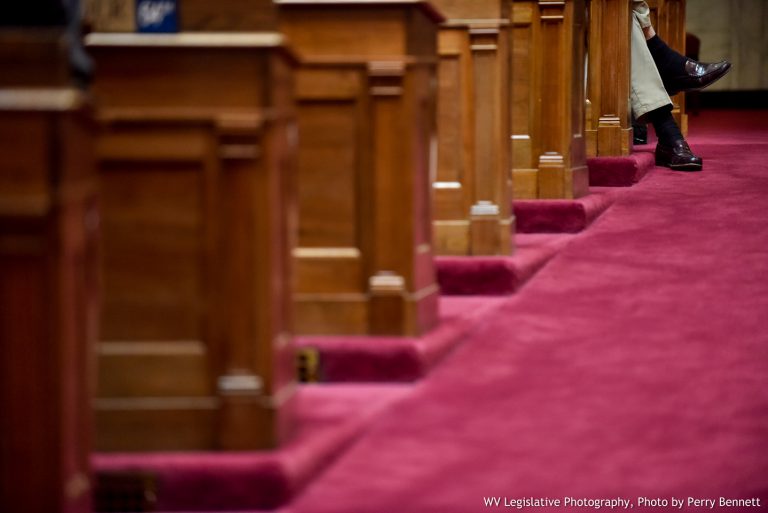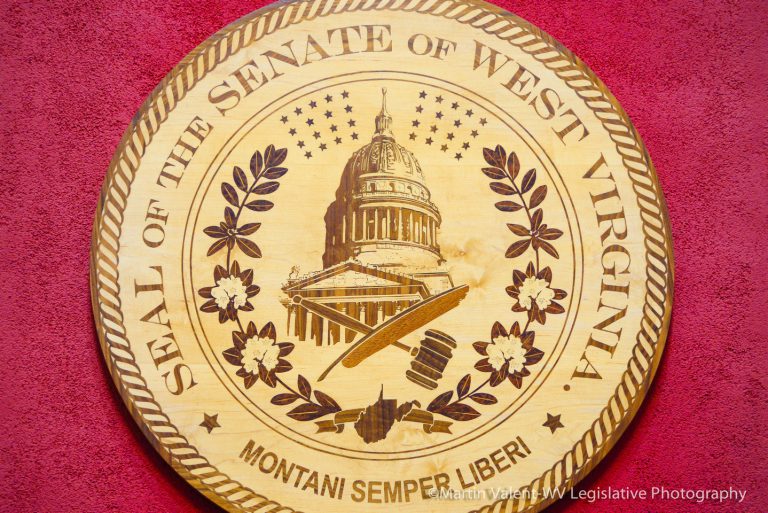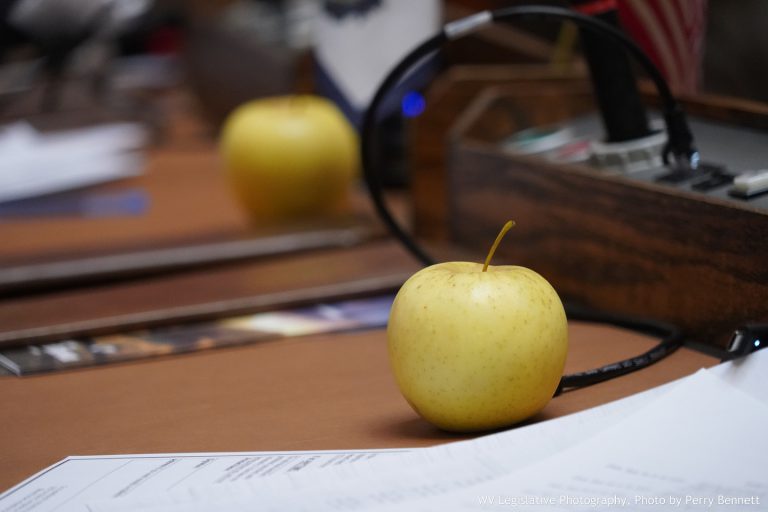In the House
As of 4 p.m., Wednesday, February 19, 2003, the 43rd day of the 2003 Regular Legislative Session, 1,073 bills have been introduced in the House of Delegates. Of those, 15 bills were passed by the House this week and will now go to the Senate for its consideration. Among those were:
House Bill 2203 would conform certain state traffic laws to federal regulations related to the use of seatbelts and Driving Under the Influence (DUI) so as to qualify for federal grants and avoid penalties against portions of federal-aid highway funds. The measure would establish the use of seat belts as a primary offense, meaning
House Bill 2433 relates to vocational-technical facility and equipment improvements through the School Building Authority. This measure would authorize the School Building Authority to require flood insurance for any facility within the 100 year flood plain at which authority funds are expended; authorizes the authority to encourage work-based learning opportunities for students on funded projects;, as well as the authority to accept any gift, grant, contribution, bequest or endowment of equipment for benefit of authority or its projects; requires the authority to reserve no more than 25 percent of funds available for priority use for multi-use vocational-technical educational facilities which may include post-secondary programs; requires a 10-year major improvement plan as prior condition for distribution of funds; prohibits the distribution of funds to a county not prepared to commence expenditure during a fiscal year; requires up-to-date enrollment projections in facilities plans and updates; authorizes inclusion of facilities for community and technical college education in plans to construct comprehensive vocational facilities at existing high schools; provides an exception from requirement for comprehensive vocational facilities in counties served by a multi-county center or existing county center; establishes a planning process if such county elects to construct a comprehensive center; and, includes introductory vocational-technical courses in middle school grades as part of effective schools for vocational-technical education.
House Bill 2511 would provide special license plates for members of the Nemesis Shrine, volunteers and employees of the American Red Cross, individuals who have received the Combat Infantry Badge or Combat Medic Badge, members of the Knights of Columbus and former members of the Legislature. The bill would provide that special registration plates may only be issued to nonprofit charitable and educational organizations currently authorized by law and would prohibit the Commissioner of Motor Vehicles from approving or authorizing additional nonprofit charitable and educational organizations to design or market special registration plates without prior authorization of the Legislature.
House Bill 2678 would change the ballot publishing dates before primary and general elections. The current law establishes a period eight to 14 days prior to an election. This measure would establish a new period of 20 to 26 days prior to an election. The measure also would: authorize certain (paper ballot)counties to count absentee ballots during an election period; alter absentee ballot signature requirements, allowing for facsimile signatures; provide for the changing of voting dates for early in person voting, by eliminating the Monday before the election (except in emergencies) and allowing for the two prior Saturdays before an election; provide for emergency early person voting the Monday prior to a Tuesday election, under special circumstances; provide for the processing of certain absentee ballots prior to closure of the polls for the purpose of determining legality; and, authorize certain changes in the early in person voting of absentee ballots.
House Bill 2729 would clarify that members of professional licensing board may be compensated only for days in which they attend official meetings or engage in official duties, and not for travel days.
House Bill 2748 would prevent mail order or internet sales of tobacco products to persons under 18 years of age. Essentially, the bill states that anyone who sells tobacco products through non-point of sales transactions would have to register with the state tax department, adopt a policy for verifying age of purchases, not deliver products except to verified addresses, and clearly mark the packages as tobacco products. The measure also would establish penalties, including a $500 fine for failure to adopt a policy and $1,000 to $2,000 for a first offense within five years, $2,500 to $3,500 for a second offense, $4,000 to $5,000 for a third offense, $5,500 to $6,500 for a third offense, and a $10,000 fine for a fifth offense. All offenses would be considered a misdemeanor and all fines collected would be deposited in the State’s General Trust Account. United State’s Postal service and package carriers are would be exempt as distributors.
House Bill 2794 would increase the service fee for worthless checks. The bill would provide any payee or holder of a check or draft order that is dishonored due to insufficient funds the ability to impose a fee of $25, increased from $15 stated in current law.
House Bill 2843 would enact the federally required provisions of the “Help America Vote Act of 2002.” This legislation would bring West Virginia’s election laws in line with recent federal changes.
House Bill 2870 would specify the jurisdiction of the Public Service Commission (PSC) over, and the application of public utility laws to, certain described electric generating facilities. The measure would require persons, corporations and other entities that intend to construct and operate electric generating facilities, or that intend to make or construct a material modification thereof, to obtain from the PSC a siting certificate, in lieu of a certificate of public convenience and necessity, for each facility or material modification thereof. The bill also would allow the PSC, under specified circumstances, to seek the imposition of civil or criminal penalties, or both such civil and criminal penalties for violations.
House Bill 2953 would create a mechanism to eliminate any actuarially projected unfunded liability in the Prepaid Tuition Trust Fund over a fixed period with funds from the Unclaimed Property Trust Fund in an amount not to exceed $2 million annually. It also would create the Prepaid Tuition Trust Escrow Account and provide for the transfer of funds in the Unclaimed Property Trust Fund to the Prepaid Tuition Trust Escrow Account and to the General Revenue Fund, as well as provide for the investment and use of this money.
House Bill 2970 would establish increased ratios for the maximum number of professional educators and of service personnel per 1,000 students in net enrollment that are funded by the state starting in 2004-05 school year. Separate ratios would be established for counties with high and low student population density per square mile. The bill would further provide for $2.5 million per year to be appropriation for the purpose of increasing the ratios beginning in the 2004 school year and concluding after 2015. Finally, the bill would direct the $2.5 million per year allocated and appropriated for the total state basic foundation program for the purpose of increasing these ratios.
House Bill 3011 would require the Fire Commission to promulgate emergency rules on or before June 1, 2003, to establish minimum training and equipment requirements for firefighters and fire departments that have chosen to do rescue work which does not involve fire prevention and control.
In the Senate
As of 4 p.m. Wednesday, February 19, 2003, the 43rd day of the 2003 Regular Legislative Session 636 bills have been introduced in the Senate. Of those, 11 bills were passed this week and will be sent to the House of Delegates for consideration. Among those passed were:
Senate Bill 340 would authorize county commissions to adopt different building restrictions in specified areas designated a flood plain, mud-slide area or flood hazard. This would clarify that county commissions may set different building restrictions in different levels of a flood plain to allow property owners to secure the lowest appropriate rate for federal flood insurance.
Senate Bill 395 would grant the Family Court Judge the power to order grandparent visitation as temporary relief during the time period in which a divorce is pending. The bill also clarifies that all issues with respect to grandparent visitation will be heard in Family Court.
Senate Bill 461 would update sections of the Corporation Net Income Tax Act, by bringing them into conformity with their meanings for federal income tax purposes.
Senate Bill 462 would update sections of the Personal Income Tax Act, by bringing them into conformity with their meanings for federal income tax purposes.
Senate Bill 56 would prohibit insurance companies, hospital service corporations, medical service corporations, health maintenance organizations (HMOs) and health care centers from requiring any person covered under an insurance contract to use a mail-order pharmacy in order to receive prescription drug benefits. The bill would also prohibit insurers from imposing an extra fee or a penalty upon the insured for using another pharmacy.
Senate Bill 400 would allow the Insurance Commissioner to disclose confidential information in certain cases in the course of his or her duty. The amendments would make these Code Sections consistent with provisions of the federal Gram-Leach-Blibley Act which are intended to encourage the exchange of information between state insurance regulators and federal banking agencies and to ensure that each party to the exchange will keep the information confidential and take reasonable steps to oppose efforts to secure disclosure of the information. This bill will add federal banking agencies to the list of entities with whom the insurance commissioner may provide certain confidential information.
Senate Bill 484 would amend the section that sets the scope of Article 20 (which deals generally with the regulation of insurance rates). The amendment would remove title insurance from the list of exemptions from the article. That is, the bill would make title insurance subject to rate filing and the Insurance Commissioner’s rate review process.
Senate Bill 485 would authorize the Insurance Commissioner to enter into certain agreements and compromises concerning the liability of any person with respect to any tax, interest, surcharge, additional tax, fee, or fine. Prior to commencing a civil action, the Commissioner could enter into a written closing agreement to settle a tax dispute. Absent fraud, malfeasance or misrepresentation of a material fact, the agreement would be final and binding. For presuit closing agreements, the Commissioner’s counsel must place an statement in the file as to the terms of the agreement and the reasons for the settlement. The Commissioner would be required to make a quarterly report to the Speaker of the House, the President of the Senate and to the Legislative Auditor which summarizes the amounts compromised, etc., and which would preserve the identity of the taxpayers.
Senate Bill 486 would require certified public accountants to notify the Insurer’s Board or Audit Committee of adverse financial condition. The bill would provide an additional safeguard against failure to properly disseminate information concerning the company’s financial condition. Under current law, an independent CPA performing an annual audited financial report is required to give written notification to the Insurance Commissioner and “an officer or director of the insurer” of a material misstatement of the financial position or shortfall of the minimum capital or surplus required by the Code.
Senate Bill 488 would establish a minimum surplus for farmers’ mutual fire insurance companies.
Senate Bill 206 would give teachers’ aides the authority to supervise students undergoing in school suspension if the instructional duties are limited to handing out and collecting class work and not actual instruction.
West Virginia Legislature Reflects Diverse Citizenry
They are doctors and farmers, educators and attorneys. They are miners and insurance agents, businesspeople and railroad workers.
At first, they may seem to have nothing in common. They may live in completely different areas of the state, or work in completely opposite industries. They aren’t neighbors; they aren’t classmates; they may be complete strangers.
But for 60 days, they are all alike in one respect: they are members of the 76th Legislature.
West Virginia has a part-time Legislature. Unlike other states where legislating is a full time profession, and Legislators are unable to have a job outside their work in government. While West Virginia Senators and Delegates work 365 days a year, they are only required to be working in the State Capitol for 60 consecutive days during the Regular Legislative Session and for any Special Sessions. The rest of the year, our Legislators have their own jobs and their own lives, many of which are far from Charleston.
America is a representative democracy, and sometimes, it is necessary to take a look at the people – not the politics – who work as its representatives.
As an area becomes more well-known for supporting a particular industry or lifestyle, the more likely it is that the representative from that area will have worked in a job that reflects the more specific interests of the people in that region.
For example, most of the farmers in the Legislature come from the agriculturally based eastern area of the state, while more miners from the southern coal fields. The northern panhandle, famous for its steel industry, has representatives who have actually worked in the steel mills.
Closer to Kanawha County, which is mostly comprised of businesses and the chemical industry, there are more lawyers, business professionals, engineers and technicians. Most of the medical professionals in the Legislature also come from the more metropolitan areas, where there are more people and more hospitals.
Educators are the only group that do not come from just one area of the state; however, as education is necessary and a major concern everywhere, this might not seem so unusual.
Of the 34 people in the Senate, a little more than one third work in some form of business. Six members are in the education field, while five Senators, or roughly 15 percent, are attorneys. The remaining 10 Senators work in a variety of fields, including insurance, healthcare, real estate development and mortuary science.
The top two professions for Delegates are business and law. Twentyseven percent of the members of the House of Delegates are in the business field, while 18 percent are attorneys. Educators are the next largest group, with 17 Delegates making up this profession. Seven people work in insurance, and another seven are in healthcare, which includes two doctors, two nurses, two pharmacists and one senior citizens’ daytime care organizer.
There are also five miners, a housewife, a Certified Public Accountant, two railroad workers, a school bus driver and a handful of farmers in the House, just to name a few.
All of the members of the Legislature have at least a high school diploma, but most have at least one college degree or have graduated from a vocational school. Several Senators and Delegates have two or three degrees from different universities. Most also received at least one degree from a West Virginia institution of higher education, although several have degrees from an outof-state college or university, and some have even graduated from Ivy League schools.
West Virginia Legislators mostly attended West Virginia University, Marshall University, Fairmont State College and Shepherd College. They attended one of these schools for a bachelor’s degree, master’s degree, doctoral or law degree.
Based on percentage, about the same number of Senators and Delegates attended WVU – about 41 percent of the Senators and 43 percent of the Delegates attended WVU. However, while 24 percent of the Senators attended Marshall, only about 15 percent of the Delegates attended that same university.
Nearly every Legislator is married, and most have children. Several have grandchildren, and a few even have great-grandchildren.
All of these people represent the many different faces of West Virginia. Their backgrounds are as diverse as the areas they represent, and reflect the needs, issues and ideas of their communities. Legislators are the voices of the people, but they are also people themselves.
In the House
As of 4 p.m., Wednesday, February 12, 2003, the 36th day of the 2003 Regular Legislative Session, 985 bills have been introduced in the House of Delegates. Of those, the following16 bills were passed by the House this week, including five Sunset Bills and will now go to the Senate for its consideration.
House Bill 2008 would provide good-faith background checks for law-enforcement personnel. This bill would provide employer immunity from civil liability for disclosing accurate and truthful information about former employees. Any information forwarded or provided to another employer, about a former law-enforcement employee, would be considered to be provided in good faith.
House Bill 2190 would permit certain farm vehicles to use the highways between sunset and sunrise. These vehicles cannot travel further than 25 miles between land tracts.
House Bill 2239 would require foreign collection agencies to obtain a certificate of authority from the Secretary of State. This bill would remove the term “licensee” from the definitions and replaced the term’s usage with “certificate of registration”, and would require that along with a business franchise registration, a collection agency must also acquire a certificate of registration from the Secretary of State’s office.
House Bill 2266 would include the State Fire Marshal and full-time fire marshals within the definition of criminal justice enforcement personnel for the purpose of authorizing the State Fire Marshal and full-time fire marshals to cooperate with and assist other law-enforcement agencies.
House Bill 2268 would name teachers and substitute teachers as professional educators and would address the critical
need and shortage thereof. This bill proposes changes in the Underwood Smith Teacher Scholarship to help address areas of critical need and shortage. The Underwood Smith program is designed to entice outstanding high school students to pursue teaching careers in the state.
House Bill 2281 would raise the allowable earnings limit of higher education faculty who retired under the severance plan. This bill would increase the amount of money that an employee, who is granted retirement and separation incentives provided under a higher education severance plan, may earn through contract employment with an institution of higher learning.
House Bill 2383 would require the state Department of Education to submit a comprehensive teacher certification plan to the Legislative Oversight Commission on Education Accountability (LOCEA) for adopting prior to July 1, 2003. If the plan is not adopted by LOCEA, beginning January 1, 2005, each county would be responsible for certifying any teacher employed in that county and for determining the standards and qualifications necessary for certification.
House Bill 2669 relates to hazardous waste management. The bill sunsets the annual certification payment for facilities that manage hazardous waste based on the fiscal year for the next three years and terminates the hazardous waste management annual certification fee and the Hazardous Waste Management Fee Fund on June 30, 2006.
House Bill 2705 relates to the supervision of adult offenders and authorizes a compact for the supervision of adult offenders. It would have the state of West Virginia become a member of a new interstate compact, the Interstate Compact for the Supervision of Adult Offenders, which is being proposed to update and replace a previous interstate compact, the Interstate Compact For the Supervision of Parolees and Probationers, originally adopted in 1937.
House Bill 2763 would allow auxiliary roof mounted lighting only when it comes as original equipment and for use only when the vehicle is off-road. These lights must be off and covered while the vehicle is on the highway.
House Bill 2802 would provide for a legal description in deeds creating an easement or right-of-way. The bill would require the description to be either in metes and bounds or by reference to an attached plat, by specification of the centerline of the easement or right-of-way, by station and offset, or by a plat or drawing which may not require a survey.
Sunset bills passed by the House
House Bill 2864 would continue the Office of Explosives and Blasting until July 1, 2004.
House Bill 2879 would continue the West Virginia Commission on Holocaust Education until July 1, 2009.
House Bill 2888 would continue the Board of Osteopathy July 1, 2006.
House Bill 2889 would continue the Board of Examiners of Psychologists until July 1, 2012.
House Bill 2916 would continue the State Geological and Economic Survey until July 1, 2007.
A sampling of bills introduced in the House
House Bill 2958 would require credit card issuers to provide adequate disclosure to consumers when soliciting credit card applications
House Bill 2893 would clarify that magistrates shall accept payment of fines and costs on a payment plan from an offender.
House Bill 2959 would prohibit health care providers from accepting gifts worth more than $25 from a pharmaceutical company.
House Bill 2960 would change the name of Fairmont State College to Fairmont State University.
House Bill 2920 would increase certain benefits to dependents of a state trooper killed in the line of duty.
House Bill 2917 would require the DMV to design and issue special registration plates for use by Democratic Executive Committee Members.
In the Senate
As of 4 p.m., Wednesday, February 12, 2003, the 36th day of the 2003 Regular Legislative Session, 508 bills have been introduced in the Senate. Of those, 17 bills were passed and will go on to the House for its consideration, including three sunset bills.
Senate Bill 170 would require informed consent for abortion, as well as other provisions. The bill would require a minimum 24-hour-waiting period during which time the physician performing the abortion would have to inform the woman of certain aspects of the procedure. The doctor would have to tell the woman the risks involved with having the abortion, the risks if she decided not to have the abortion, and the gestational age of the fetus. The bill would allow for an exception to be made in an emergency when the woman’s life is in danger.
Senate Bill 204 relates to involuntary commitment generally. This bill would remove wording that would prevent an incarcerated individual from being subject to mental hygiene proceedings, such as a psychiatric evaluation.
Senate Bill 206 would authorize aides to supervise students who are undergoing in-school suspension. The bill also would provide for limitations such as allowing an aide to only pass out or take up class work but not actually teach the students in the class.
Senate Bill 336 would require health care professionals to use a standardized form for credentialing, recredentialing or updating information.
Senate Bill 342 would limit the time a driver’s license may be issued to certain non-citizens. Anyone who is not a US citizen would only have a driver’s license for the amount of time he or she is in the country, although it cannot exceed five years. The license would be renewed at the discretion of the Commissioner of the
Senate Bill 356 relates to insurance company holding systems and the Federal GrammLeach-Bliley Act. The bill would allow insurance companies to acquire or be acquired by depository institutions and would amend the period of time within which an action may be taken by the Insurance Commissioner upon a statement filed by a person who wants to get control of an insurance company. The bill also would authorize the Commissioner to share certain confidential information about the company with the Board of Governors of the Federal Reserve System or other appropriate federal banking agency.
Senate Bill 358 relates to the redomestication of domestic insurance companies. A domestic insurer can, upon the approval of the Insurance Commissioner, transfer its domicile to any other state in which it is admitted. When such a transfer occurs, the company would cease to be a domestic insurer and become a foreign insurer. The commissioner could only approve the transfer if he or she determines that it is in the best interests of the policyholders of the state.
Senate Bill 375 would allow the transfer of a contractor’s license to a new business associate if the license holder is the principal owner, partner or officer of the company.
Senate Bill 381 would add professional surveyors to professional limited liability companies.
Senate Bill 388 would modify the requirements for the titling and registration of imported vehicles. An automobile would have to meet Federal Safety and Emissions Standards and the owner of the vehicle would have to be able to prove that the vehicle meets those standards before it could be sold.
Senate Bill 390 would remove the requirement that a person’s social security number appear on a commercial driver’s license (CDL). The license would still have to include the driver’s name, eye and hair color, weight, gender, date of birth, address, signature and color photo.
Senate Bill 414 would authorize the Real Estate Commission to enter into license reciprocity agreements with other states.
Senate Bill 424 would authorize the Commissioner of Corrections to consent to the transfer of convicted offenders under Federal treaty. It also would require that the inmate be informed of his or her rights in words he or she can understand.
Senate Bill 447 would allow reciprocal agreements with Ohio regarding hunting and fishing. The measure would allow agreements established by he DNR whereby the residents of West Virginia and Ohio may hunt waterfowl and fish in and along tributaries on both sides of the Ohio River without additional licensing.
Sunset Bills passed by the Senate
Senate Bill 469 would continue the Contractor Licensing Board until July 1, 2006.
Senate Bill 470 would continue the Board of Manufactured Housing Construction and Safety until July 1, 2005.
Senate Bill 471 would continue the Board of Pharmacy until July 1, 2008.
A sampling of bills introduced in the Senate
Senate Bill 466 would authorize expeditions for hunting black bear with dogs.
Senate Bill 486 would require Certified Public Accountants (CPAs) to notify the Insurer’s Board or Audit Committee of an adverse financial condition.
Senate Bill 491 would authorize the Bureau for Child Support Enforcement to reduce monthly support payments when overpaid.
Senate Bill 489 would authorize the Parkways Authority to provide wireless communication coverage.
Senate Bill 465 would allow certain retail markup on cigarettes and beer.
Senate Bill 457 would allow counties adopting flood plain ordinance to designate an enforcement agency.
Senate Bill 459 would prohibit the renaming or rededication of certain monuments and memorials.
Senate Bill 453 would establish the Domestic Violence Fatality Review Team.
Senate Bill 479 would prohibit municipalities from closing a Fire Department without State Fire Marshal approval.
Senate Bill 468 would repeal the requirement that the Tax Commissioner report annually the amount of fuel tax collected.
Senate Bill 458 would require hospitals to implement a plan eliminating or reducing medication-related errors.
Senate Bill 492 would exempt tax for materials and services used in coal preparation plants.
Senate Bill 478 would enact the Tax Free Family Meal Act of 2003.
Civic Education Key to Public Participation
Civic education is essential to upholding the principles of democracy in America. A democratic society must rely on people’s knowledge, skill and interpretation of the law in order to govern themselves efficiently. The primary opportunity for most American citizens to acquire the knowledge and dispositions essential for informed, effective citizenship is during their school years. Civic education, therefore, is vital to the preservation and improvement of American constitutional democracy.
More than ever, children need to become informed about how a democracy operates and what it takes to preserve a democratic government. In a time when outside influences threaten to disassemble American ideals, it is imperative that civic education is stressed as a necessary tool for informing Americans of the values and principles of a free society.
The West Virginia Legislature realizes the importance of civic education and offers a variety of programs and publications to promote it. The Page Program, Children’s Day, a Children’s Website and “How a Bill Becomes Law,” which is a publication that teaches the process of law making, all provide assistance when trying to gain a better understanding of how state government operates.
The Page Program offers West Virginia youth the opportunity to help aid in the legislative process. They perform a variety of tasks including observing the floor sessions of both House and Senate. They do work for both Delegates and Senators, which includes delivering documents and running errands. This program offers children a chance to witness legislation and the process by which the Legislative Branch works.
The Legislature also has a Children’s Day on February 19th that promotes civic education. Children are encouraged to visit the Capitol Complex, meet with their representatives and witness the lawmaking process. This allows children to gain a better understanding of what goes on inside of the Capitol
and how laws are made. Students are encouraged to visit the Legislature while in session, whether it be as part of Children’s Day or through school field trips and family visits.
The children’s website offered by the Legislature is a very informative site that provides detailed information in regard to lawmaking. The site offers a variety of exercises including historical trivia and State Capitol facts. The site also provides information about the three branches of government as well as a “did you know section.” To access the website go to www. legis.state.wv.us.
The Legislature also publishes a brochure titled, “How a Bill Becomes Law,”as part of the WV Legislature’s Kids Club. This is a informative publication on the steps a bill goes through before it becomes law. It is important that children learn this process because laws are ideas that can help to make a positive change in people’s lives. The brochure offers comprehensive pictures and detailed information that explains the process, so children can easily learn the path a bill takes to becoming law.
The teaching of civic education is very important. Young people need to become informed on how a democratic society operates and maintains itself in order to improve the process. Children must be guided by those values and principles of a democratic society and act upon them to preserve the democratic way of life in our communities and nation.
In the House
As of 4 p.m., Wednesday, February 5, 2003, the 29th day of the 2003 Regular Legislative Session, 879 bills have been introduced in the House of Delegates. Of those, the following 16 were passed by the House this week, including nine Sunset Bills, and will now go to the Senate for its consideration:
House Bill 2155 would cap tuition increases at public colleges, community colleges and universities. An increase in any year would not exceed 3 percent unless the Higher Education Policy Commission (HEPC) is satisfied by a particular institution’s necessity, in which case the HEPC could authorize an institution to increase tuition a maximum of 5 percent. This cap would not apply to tuition rates for non-resident or medical students.
House Bill 2301 would provide, through a maintenance bond, funding for necessary care of animals seized because of allegations of neglect. This bill would require that magistrate courts, upon finding probable cause, award custody of the animal to any humane officer for further disposition. The owner of the animal would be required to post a bond with the court within five days following the court’s finding of probable cause.
House Bill 2512 relates to competitive bidding and notice requirements for the development of natural resources in which the Public Land Corporation has an interest. This bill would impose additional public notice requirements and require a public hearing before the Public Land Corporation enters into a lease or contract for the mining or drilling of minerals, gas or oil.
House Bill 2693 would provide the West Virginia State Police with the ability to define and draw DNA samples from convicted
felons for the purpose of maintaining a DNA database. This bill would allow the State Police to require any person convicted of a felony offense after July 1, 2003 to provide a DNA sample to be used for DNA analysis.
House Bill 2694 would protect the beekeeping industry by authorizing the Commissioner of the Department of Agriculture to seize, destroy, treat, return or stop the delivery of all appliances, bees, bee equipment, products or hives transported into or within West Virginia that are found to be infected with honey bee pests.
House Bill 2704 would have West Virginia become a member of the Interstate Compact for Juveniles for the supervision and return of juvenile offenders or runaways. This new compact would not become effective until it has been adopted by 35 states.
House Bill 2781 relates to the transfer, retirement or disposal of State Police canines. This bill would authorize the Superintendent to transfer the ownership of State Police dogs who are determined to no longer be of use to the State Police. The dog could be transferred to the animal’s handler; to the care and custody of an animal shelter, humane society or society for the prevention of cruelty to animals; or, to another person who wishes to have the animal as a pet.
Sunset bills passed by the House
House Bill 2750 would continue the Office of Health Facility Licensure and Certification until July 1, 2007.
House Bill 2751 would continue the West Virginia Department of Health and Human Resources until July 1, 2004. House Bill 2752 would continue the Bureau of Senior Services until July 1, 2009.
House Bill 2778 would continue the West Virginia State Police until July 1, 2004.
House Bill 2779 would continue the Ron Yost Personal Assistance Services Program until July 1, 2006.
House Bill 2803 would continue the Board of Barbers and Cosmetologists until July 1, 2008.
House Bill 2829 would continue the Division of Culture and History until July 1, 2005.
House Bill 2830 would continue the Division of Natural Resources until July 1, 2004.
House Bill 2831 would continue the Records Management and Preservation Board until July 1, 2004.
A sampling of bills introduced in the House
House Bill 2826 would reduce the allowable blood alcohol content for driving under the influence from 0.10 to 0.08 of one percent of body weight.
House Bill 2832 would prohibit cloning of human beings and embryos. Anyone who violates these provisions would be guilty of a felony and, upon conviction, would be fined $5,000 to $10,000, and/or imprisoned for one to three years.
House Bill 2858 would secure the right of blind and visually impaired people to vote under the same conditions of privacy and independence as sighted people. This would be made possible by electronic voting technology and systems in accordance with certification criteria for equal access by visual and nonvisual means. The Secretary of State would be responsible for implementation of this procedure.
House Bill 2850 would provide protection for school employees who are being harassed. Persons who violate this proposal would be guilty of a misdemeanor and, upon conviction, would be incarcerated in jail for 90 days-toone year, fined $2,000 to $5,000 or both. A second or subsequent conviction occurring within five years of a prior conviction would be a felony punishable by a one year to five year incarceration, a fine of $3,000 to $10,000 or both. This bill also allows restraining orders to be issued.
House Bill 2820 would provide for the adequate staffing of nursing homes and training of nursing home staff. This bill outlines specific ratios of staff to residents during all shifts of long term care facilities. These ratios would consist of minimum standards only and nursing homes would be permitted to employ additional staff as needed. This bill also would require a commission to assess the staffing ratios and standards outlined in this legislation. In addition, this bill would require nursing homes to post current staffing information, provide enhanced training requirements for nurse aides and provide a grant program for projects targeted at reducing employee turnover in nursing homes.
House Bill 2821 would provide an environment in hospitals where quality care can be provided to patients. The bill accomplishes this by allowing most employees involved in direct patient care activities or clinical services to refuse to work overtime, except in certain emergent situations.
House Bill 2804 would allow a municipal police officer to issue citations for misdemeanor offenses committed in his or her presence. This bill would allow municipal police to stop and cite reckless drivers outside the city limits when the officer is driving to or from magistrate or circuit court.
House Bill 2836 would require ATVs used off of private property to be registered with the Division of Motor Vehicles and to be subject to an annual registration fee of $10.








